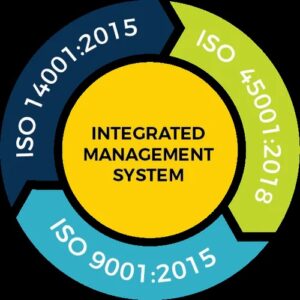Driving Performance: Excelling in the IMS Internal Auditor Course

Key Components of an IMS: Understanding the Integrated Management System Framework
The Integrated Management System (IMS) is a powerful framework that combines various management systems, such as quality, environment, and health and safety, into a single, integrated approach. Understanding the key components of an IMS is essential for internal auditors as it provides a holistic perspective and enables effective auditing across multiple disciplines.
Within an IMS, organizations establish processes and procedures that align with international standards and regulatory requirements. These processes address various aspects, including policy development, risk assessment, objectives setting, implementation, monitoring, and continuous improvement. By understanding the key components of an IMS, internal auditors can assess the effectiveness and efficiency of these processes, identify areas for improvement, and ensure compliance with relevant standards.
IMS Internal Auditor Certification: Requirements and Benefits
Becoming a certified IMS internal auditor requires specific qualifications, experience, and knowledge. Typically, certification programs have prerequisites that include prior experience in auditing, knowledge of relevant management systems, and completion of specific training courses. These requirements ensure that individuals possess the necessary skills and expertise to carry out internal audits effectively within an IMS framework.
The benefits of being a certified IMS internal auditor are significant. Firstly, certification enhances career prospects and credibility within the field of auditing. It demonstrates your commitment to professional development and validates your competence in auditing integrated management systems. Certified auditors are highly sought after by organizations looking to improve their overall performance and compliance.
Moreover, certified IMS internal auditors contribute to organizational improvement by identifying opportunities for process optimization, risk mitigation, and compliance enhancement. Their in-depth understanding of the IMS framework allows them to provide valuable insights and recommendations to management for strategic decision-making. By becoming a certified IMS internal auditor, professionals can elevate their expertise and make a substantial impact on organizational success.
Course Curriculum Overview: Topics Covered in the IMS Internal Auditor Training
The IMS Internal Auditor Course covers a wide range of topics to equip participants with the necessary knowledge and skills to conduct effective internal audits within an integrated management system. The curriculum typically includes auditing principles, regulatory compliance, risk assessment, process improvement methodologies, and audit techniques specific to an IMS.
Participants will learn about the principles and concepts of auditing, including audit planning, execution, and reporting. They will understand the importance of regulatory compliance and how to assess an organization’s adherence to applicable laws and regulations. The course will also delve into risk assessment methodologies, enabling auditors to identify and prioritize risks within the IMS context.
Additionally, participants will gain insights into process improvement methodologies, such as lean and Six Sigma, to identify opportunities for enhancing efficiency and effectiveness. They will also learn how to apply audit techniques specific to integrated management systems, including documentation review, interviewing skills, and evidence collection.
The comprehensive nature of the IMS Internal Auditor Course ensures that participants develop a well-rounded understanding of internal auditing within the context of an integrated management system. Upon completion, participants will be equipped with the knowledge and skills necessary to effectively assess an organization’s IMS and contribute to its continual improvement.
Training Methods and Delivery
The IMS Internal Auditor Course is delivered using a variety of training methods to enhance the learning experience and ensure maximum knowledge retention. These methods may include classroom-based sessions, practical exercises, case studies, group discussions, and interactive workshops.
Classroom-based sessions provide participants with a structured learning environment where they can engage with expert trainers and fellow participants. These sessions cover theoretical concepts, industry best practices, and real-world examples to enhance understanding and application.
Practical exercises and case studies allow participants to apply their knowledge in simulated auditing scenarios. These activities help develop critical thinking skills, problem-solving abilities, and the ability to make sound auditing judgments.
Group discussions and interactive workshops encourage active participation and knowledge sharing among participants. During these sessions, participants can exchange ideas, perspectives, and experiences related to auditing integrated management systems. This collaborative approach fosters a deeper understanding of the subject matter and promotes peer learning.
To further enhance the training experience, technology-driven tools and resources may be utilized. These can include online learning platforms, multimedia presentations, and interactive simulations. These resources provide flexibility and convenience, allowing participants to access course materials and engage in learning activities at their own pace and convenience.
The training may also incorporate real-life case studies and examples to bridge the gap between theory and practice. By analyzing and discussing actual scenarios, participants gain practical insights into the challenges and opportunities faced by IMS auditors.
Overall, the diverse training methods and delivery approaches used in the IMS Internal Auditor Course aim to cater to different learning styles and maximize knowledge acquisition. By combining theoretical knowledge, practical exercises, group interactions, and technological resources, the course ensures a comprehensive and engaging learning experience for participants.
Through effective training methods and delivery, participants will not only acquire the necessary knowledge and skills to excel in their role as IMS internal auditors but also develop a solid foundation for continual professional growth and contribution to organizational success.
Course Coverage
In addition to the interactive training sessions, the IMS Internal Auditor Course also emphasizes practical application through hands-on exercises and simulations. Participants are given the opportunity to conduct mock audits and assess compliance with ISO standards. These practical exercises help participants develop their auditing skills, including conducting interviews, gathering evidence, and identifying areas for improvement.
Furthermore, the course covers the importance of effective communication and interpersonal skills for auditors. Participants learn how to effectively communicate audit findings, engage with stakeholders, and facilitate discussions to drive positive change within organizations. These skills are essential for building rapport, gaining cooperation, and fostering a collaborative approach to improving the effectiveness of integrated management systems.
Another crucial aspect of the IMS Internal Auditor Course is the focus on continuous improvement. Participants learn about the principles of continual improvement and how to apply them in the context of auditing. They are encouraged to identify opportunities for process optimization, risk mitigation, and innovation within organizations. This mindset of continuous improvement helps auditors drive performance and ensure the long-term success of integrated management systems.
Throughout the course, participants also gain a thorough understanding of the documentation requirements and record-keeping practices for auditing integrated management systems. They learn how to maintain accurate and reliable audit records, which serve as essential documentation for compliance verification and future reference.
Lastly, the course highlights the ethical considerations and professional conduct expected from IMS internal auditors. Participants are educated on the importance of maintaining confidentiality, objectivity, and impartiality throughout the auditing process. Upholding these ethical standards helps build trust and credibility in the audit profession and ensures the integrity of the auditing process.


 English
English 


